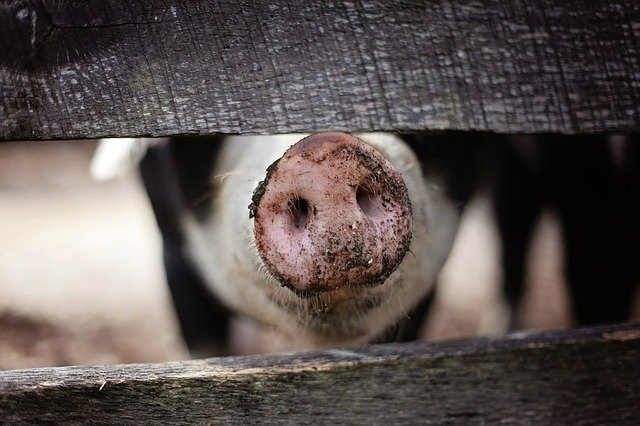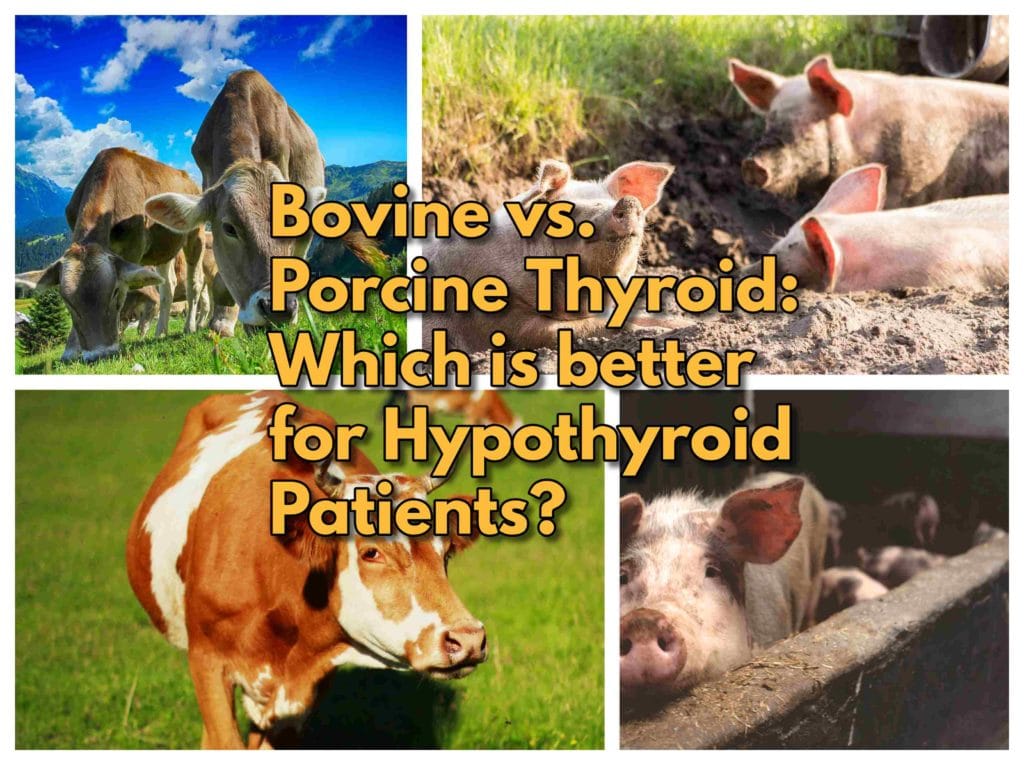There are two main types of thyroid hormone replacement therapy: synthetic thyroid hormone (such as levothyroxine) and natural thyroid hormone (such as Armour Thyroid, NP Thyroid or VitaliThy).
Both types of therapy are effective for boosting metabolism, but there are some differences between them.
Synthetic thyroid hormone (levothyroxine) is similar to one of the hormones produced by the thyroid gland: thyroxine (T4). It is by far the most common form of thyroid hormone replacement therapy as it’s the cheapest and most profitable prescription drug.
Natural thyroid hormone is derived from the thyroid glands of animals (usually pigs but can be made of bovine thyroid too). It contains both thyroxine (T4) and triiodothyronine (T3) hormones. According to a randomized, double-blind, crossover study, most patients who tried both prefer Natural Desiccated Thyroid (NDT).
If you’re looking for a natural thyroid hormone replacement, you may want to consider a bovine or porcine option. Both of these options more closely resemble hormones produced by the human thyroid gland than just synthetic levothyroxine.
But which is the better choice for you? Read on to learn more!

What is Porcine Thyroid?
Porcine thyroid is a natural supplement or medication ingredient made from the dried thyroid tissue of pigs. It has been used for centuries in Traditional Chinese Medicine (TCM) to treat various conditions, including hypothyroidism and fibromyalgia. It is important to realize that they work differently than herbal thyroid supplements.
In Western Medicine porcine thyroid has been used for more than 100 years as a dessicated thyroid extract.
Desiccated Thyroid Extract used in all prescription NDT drugs is of porcine origin:
- Armour Thyroid
- Nature Thyroid
- Nature-Throid
- NP Thyroid
- Westhroid
- Bio-Throid
- Westhroid-P
- WP Thyroid
- NP Thyroid
- Thiroyd
- TR Thyroid
- Thyroid-S
- Thyroidum
Over the Counter Supplements containing porcine thyroid you can buy online:
- VitaliThy by Eastern Pharmaceuticals: 38mcg of T4 and 9 mcg of T3 per capsule
- Metavive I (Metavive 1) or Metivive One by Procepts: 9,5mcg of T4 and 2,25 mcg of T3 per capsule
- Metavive II (Metavive 2) or Metavive Two by Procepts: 19mcg of T4 and 4,5 mcg of T3 per capsule
- Real Thyroid by Eastern Pharmaceuticals: 38 mcg of T4 and 9 mcg of T3 per tablet
The ratio of T4 to T3 in porcine supplements or medicines is about 4:1. Which means that for every 4 mcg of T4 you will get 1 mcg of T3. This is the ideal ratio for thyroid support for most people who struggle with thyroid issues, liver problems or adrenal fatigue.

What is Bovine Thyroid?
Bovine thyroid is a natural supplement ingredient made from the dried thyroid tissue of cows. It is commonly used to treat thyroid disorders, such as hypothyroidism. Bovine thyroid may also be effective in treating other conditions, such as obesity, fatigue, and depression.
This ingredient has many different names: raw bovine thyroid, bovine glandular, bovine thyroid tissue, bovine glandular supplement, and cattle thyroid.
Bovine thyroid Supplements containing Bovine Thyroid:
- Thyroid 130 by Bio-Design
- Grassfed Beef Thyroid by Ancestral Supplements
- Metavive III by Procepts
- Metavive IV by Procepts
- Bovine Thyroid Health by Nutri-Meds
- Thyroid by Allergy Research Group
- Thyro-Gold by Natural Thyroid Solutions
- Thyrovanz by Provanz Supplements Inc.
Most beef thyroid glandular supplements are in the form of bovine thyroid capsules. Thyroid glands are used to make bovine thyroid powder usually comes from grass-fed cows raised on pastures of New Zealand or Argentina. They are usually grown without the use of growth hormones. Usually
The purpose of a good Bovine Thyroid glandular supplement is to provide whole food glandular support for the thyroid gland and to provide thyroid hormones.
How to use bovine and porcine thyroid?
There are a few things to keep in mind when taking bovine or porcine thyroid extract. First, it is important to take the extract on an empty stomach. This allows for optimal absorption of the thyroid hormones.
Second, it is best to start with a lower dose e.g. one capsule and increase gradually as needed. This allows your body to adjust to the thyroid hormones and helps minimize any potential side effects.

The risks of bovine and porcine thyroid: what are the potential risks associated with using porcine or bovine thyroid?
When it comes to treating thyroid conditions, bovine and porcine thyroid glandulars have been used as an effective natural treatment option for many years.
However, as with any natural treatment option, there are potential risks associated with using porcine thyroid. The most common risk associated with bovine thyroid is the potential for allergic reactions.
While not everyone who takes bovine or porcine thyroid will experience an allergic reaction, those who are allergic to pork or beef products may be more likely to experience a reaction to porcine thyroid. Symptoms of an allergic reaction can include itching, swelling, and difficulty breathing. If you experience any of these symptoms after taking natural thyroid, stop taking the supplement and seek medical attention immediately.
Another potential risk associated with porcine or bovine thyroid is its potential to interact with other medications you may be taking. Both bovine and porcine thyroid can interact with a variety of medications, including blood thinners, blood pressure, heart medications, and certain cancer treatments.
If you are taking any medications, it is important to speak to your doctor before taking porcine thyroid to ensure that there will be no interactions.
Finally, it is essential to note that porcine thyroid medications or supplements are not regulated by the FDA. This means that there is no guarantee of its safety or effectiveness for people living in the USA.
As with any supplement, it is always best to speak to your healthcare professional before taking porcine thyroid or any other natural treatment option.

Side effects of Bovine and Porcine thyroid glandulars
Are you considering taking a thyroid glandular supplement? If so, you may be wondering about the potential side effects. Thyroid glandulars are derived from the thyroid glands of cows (bovine) and pigs (porcine).
While thyroid glandulars are generally considered safe, they can cause some side effects. These include:
- Nausea
- Headache
- Insomnia
- Heart palpitations (increased heart rate)
- Anxiety
- Diarrhea
- Joint pain
- Irregular heartbeat
- High blood pressure
If you experience any of these side effects, stop taking the supplement or medicine and consult your doctor. Thyroid glandulars can also interact with certain medications. So, if you’re taking any medications, be sure to talk to your doctor before starting a thyroid glandular supplement.
Overall, thyroid glandulars are safe for most people.
Which thyroid glandular is better Bovine or Porcine?
There are many factors to consider when choosing a porcine or bovine thyroid supplement. The most important factor is consistency.
Porcine thyroid is more consistent, especially if the manufacturer uses Thyroid USP. This is because the USP sets strict guidelines for preparing porcine thyroid glandulars.
Bovine thyroid glandulars are not subject to the same guidelines, so they can vary widely in quality and potency.
Cattles’ level of hormones fluctuates over the year more than pigs. This is because pasture-raised, grass-fed cattle are seasonal breeders and their thyroid hormone levels need to fluctuate in order to prevent them from calving in the middle of winter, which could be deadly for both the cow and the calf. This difference in seasonal thyroid hormones levels could influence level of thyroxine and triiodothyronine in bovine thyroid.
Another important factor to consider is the source of the thyroid glandulars. Porcine thyroid glandulars are typically derived from pigs raised in the United States, United Kingdom or China, while bovine thyroid glandulars are typically derived from cows raised in Argentina, United Kingdom or New Zeland. The quality of the thyroid glandulars can vary depending on the source.
Porcine thyroid glandulars from the United States are generally of higher quality than bovine thyroid glandulars from Argentina or New Zeland. Finally, it is important to consider the price of the thyroid glandulars. Porcine thyroid products are typically more expensive than bovine thyroid glandulars.
However, the higher price is often worth it for the increased quality and consistency of porcine thyroid glandulars.
Otherworldy considerations bovine vs. porcine thyroid
Pigs are not considered halal or kosher, so if you follow those dietary restrictions, you’ll want to avoid porcine thyroid glandular or desiccated thyroid extract medications. Additionally, some Hindus believe that cows are sacred and should not be consumed, so bovine thyroid glandular may not be an option for them either.
What’s more important to you: getting a slightly better product or avoiding eternal damnation? You decide!
Conclusion: bovine vs porcine thyroid
There is no clear consensus on which type of thyroid supplement is best for hypothyroid patients. Some patients find relief with bovine thyroid supplements, while others find porcine thyroid supplements to be more effective. Ultimately, it is up to the individual patient to experiment with different types of thyroid supplements to see what works best for them. Myself, I have been taking different brands of porcine thyroid since 2014. Now I take Natural Desiccated Thyroid you can buy online called VitaliThy.
FAQ Bovine vs Porcine thyroid
Is there a bovine thyroid medication?
There is no bovine thyroid medication available on the market. All thyroid medication are made from pig thyroid glands. This is because the pig thyroid gland is very similar in structure and function to the human thyroid gland.
Is Armour Thyroid bovine or porcine?
The active ingredient in Armour thyroid is actually derived from porcine sources, not bovine. This is important to know because some people may have allergies to one or the other. Unfortunately buying Armour Thyroid online is difficult without a prescription.
Where does porcine thyroid come from?
There are several different brands of porcine thyroid available on the market today. Most of these come from China, though some are also made in the USA, Spain, Denmark, and Germany.
Is porcine thyroid available?
There’s been a lot of talk lately about porcine thyroid and whether or not it’s available. Well, I’m here to set the record straight: yes, porcine thyroid is usually available. To compounding pharmacies or manufacturers.
Now, I know what you’re thinking: “But I thought porcine thyroid was banned in the United States!” Well, you’re not wrong. In 2018, the FDA banned the import of porcine thyroid products from China due to concerns about potential health risks. However, that doesn’t mean that porcine thyroid is entirely unavailable. There are many companies that still produce and sell porcine thyroid products, and many of them are available.
How much bovine thyroid should I take?
There is no easy answer regarding how much bovine thyroid you should take. Every person is different, and what works for one person might not work for another.
The best way to determine the right dose for you is to ask the manufacturer, seller, or healthcare professional who recommended the product. They will be able to give you specific guidance based on your individual needs. In general, it is important to start with a low dose and increase gradually as needed. This will help you to avoid side effects and ensure that you are getting the most benefit from the supplement. Bovine thyroid is a powerful tool, but it is important to use it safely and effectively. With the help of a knowledgeable professional, you can find the right dose for you and enjoy all the benefits that this supplement has to offer.
3 thoughts on “Bovine vs. Porcine thyroid: Which is Better for Hypothyroid Patients?”
Pingback: NP Thyroid Reviews & Ratings: 15 Honest opinions - Thyroid And Metabolism
Pingback: Natural Glandular Thyroid: What is it and should you take it? - Thyroid And Metabolism
Pingback: Can you Buy NP Thyroid online without prescription? - Thyroid And Metabolism
Comments are closed.